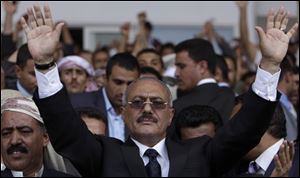
Yemen’s leader to step aside in 30 days
Saleh agrees to proposal by Gulf Arab mediators
4/23/2011
In this photo from April 15, Yemeni President Ali Abdullah Saleh waves to his supporters during a rally in Sanaa,Yemen. Yemen's embattled president Saleh agreed Saturday to a proposal by Gulf Arab mediators to step down within 30-days and hand power to his deputy in exchange for immunity from prosecution, a major about-face for the autocratic leader who has ruled for 32-years.
SANAA, Yemen — Yemen’s embattled president agreed Saturday to a proposal by Gulf Arab mediators to step down within 30 days and hand power to his deputy in exchange for immunity from prosecution, a major about-face for the autocratic leader who has ruled 32 years.
Seven opposition parties said they accepted the deal with reservations.
Even if the differences are overcome, the opposition parties do not speak for all of the hundreds of thousands of protesters seeking President Ali Abdullah Saleh’s ouster.
Signs were emerging that a deal on those terms would not end confrontations in the streets.
Daily protests have presented stunning defiance in the face of a crackdown that has included sniper attacks and has killed more than 130 people.
The uprising and a wave of defections by allies, including several top military commanders, have left Mr. Saleh clinging to power and now appear to be pushing him to compromise on his earlier refusal to leave office before his term ends in 2013.
The United States has watched the uprising with particular concern because Mr. Saleh has been an ally in fighting al-Qaeda.
U.S. State Department spokesman Mark Toner said Washington welcomes the proposal for ending the crisis and called for immediate dialogue by all sides on a transfer of power.
“We will not speculate about the choices the Yemeni people will make or the results of their political dialogue,” he said. “It is ultimately for the people of Yemen to decide how their country is governed.”
The opposition movement, fed up with poverty and corruption under Mr. Saleh, took inspiration from the toppling of leaders in Tunisia and Egypt and has grown in numbers since February.
Under the Gulf Cooperation Council’s proposal, Yemen’s parliament would grant Mr. Saleh protection from prosecution.
The president would submit his resignation to lawmakers within 30 days and hand power to his vice president, who would call for elections.
Opposition spokesman Mohammed Kahtan described the initiative as “positive” and said the opposition party leaders have agreed on it.
But he listed several reservations.
He said the opposition rejects the draft proposal’s call for the formation of a national unity government within seven days of the signing of a deal and wants to see Mr. Saleh step down first.
“We would have to swear an oath to Saleh, who has already lost his legitimacy,” he explained.
They are also against giving Yemen’s parliament — dominated by Mr. Saleh’s party — the power to approve or reject his resignation, which opens the door to allowing the president time to stall.
Mohammed al-Sabri, another spokesman of the opposition, said that if the parties sign the initiative it does not mean the protests will end.
“We don’t represent everybody in the squares. We only represent the political parties,” he said.